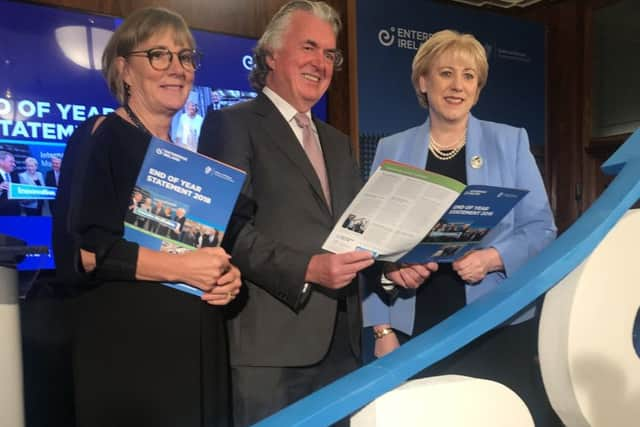25,000 jobs at risk in event of no-deal Brexit, claims Ireland's business minister
and live on Freeview channel 276
Ireland’s Minister for Business Heather Humphreys said she has warned firms to prepare for the worst while the government “negotiates for the best” outcome.
The minister was speaking at an event to mark the end-of-year statement of Enterprise Ireland – an agency which helps Irish businesses export sales.
Advertisement
Hide AdAdvertisement
Hide AdSome of the biggest risks businesses face amid fears of the UK crashing out the European union include tariffs going into the UK markets and the loss of value in the sterling.


Ms Humphreys said that companies across Ireland have been warned to prepare for all eventualities.
Her comments come as MPs in Westminster resumed the debate on Theresa May’s EU Withdrawal Agreement before the crucial vote takes place next Tuesday.
“At this stage in the process we had hoped Ireland would have had full clarity on its impact (of Brexit),” she said.
Advertisement
Hide AdAdvertisement
Hide Ad“The government has been preparing for Brexit since before the UK referendum took place and regardless of the outcome of next week’s vote in Westminster, we will continue supporting our companies to get ready for the changes ahead.”
The CEO of Enterprise Ireland, Julie Sinnamon said that the issues Irish firms are concerned about remain the same.
“The issue which has been the biggest impact to date for our clients has been the volatility and the loss of value of sterling and the impact that has had on cash coming into clients,” she said.
“The transition arrangement for clients is paramount in their mind and there is a lot of uncertainty on that side. Customs is the number one issue that companies are concerned about.
Advertisement
Hide AdAdvertisement
Hide Ad“It is absolutely critical that companies do the planning. The outcome may not be known but we need to plan.”
She said that some 74 million euros was approved last year to help 535 Brexit-exposed companies.
“Based on a hard Brexit, up to 25,000 jobs would be the approximate number that would be vulnerable,” she added.
Speaking to reporters, the minister said that while there is “nothing good” about Brexit, the government will help businesses become more competitive and encourage them to invest.
Advertisement
Hide AdAdvertisement
Hide Ad“We have been asking businesses to prepare for the worst outcome while we negotiate for the best,” she added.
The minister is a Fine Gael Cavan-Monaghan TD who lives on the border between the Republic and Northern Ireland.
In response to fears of a return to a hard border, she said she could not “countenance” that outcome.
“We want to continue on doing what we are doing. Thousands of people travel over (the border) and back, whether it’s to Armagh to work or from Armagh to Monaghan to work every day – we want that to continue,” she added.
Advertisement
Hide AdAdvertisement
Hide AdAt the event is was revealed that more than 18,800 new jobs were created through the agency with 61% of new companies set up outside of Dublin.
The strongest increases were in the life sciences, construction and electronics sectors.
The minister added: “2018 was a very strong year for job creation among Enterprise Ireland clients. The agency now has the highest levels of employment in its history.
“It has been a great year for Enterprise Ireland, given the challenges we have had in terms of Brexit and currency volatility.”